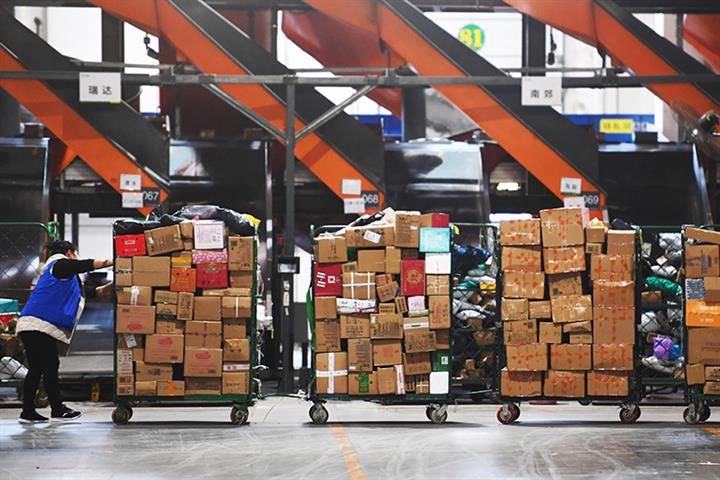 China’s Online Shoppers Nearly Triple to Over 840 Million
China’s Online Shoppers Nearly Triple to Over 840 Million(Yicai Global) Sept. 27 -- E-commerce has burgeoned in China over the past decade, with the number of online shoppers having reached 841 million as of the end of June, accounting for 80 percent of the total number of netizens, according to official data.
A decade ago, in 2013, the figure was just 302 million, making up 49 percent of the nation’s total number of internet users.
Not surprisingly, express package volumes are also increasing rapidly. Some 108.30 billion packets were handled by express delivery services across the country last year, up more than 11 times from 9.19 billion in 2013, according to State Post Bureau figures.
As the number of online shoppers and purchases have surged, the e-commerce sector has also undergone great changes in consumer purchase experience, logistics supply chain, and business strategy.
From PCs to Live-Streaming
China’s e-commerce consumers have gradually changed the way they place orders, moving from personal computers to mobile apps, with the latter’s share of deals growing year by year.
By the time of the ‘Double 11’ sales gala in 2017, a big shopping extravaganza, the Taobao and JD apps, owned by China’s two leading e-commerce rivals Alibaba Group Holding and JD.Com, notched up sales that accounted for over 90 percent and 89 percent of their totals.
As transactions shifted to mobile apps, live-streaming e-commerce platforms quickly began to attract large numbers of buyers. According to China Internet Network Information Center data, as of June, the number of e-commerce live-streaming users was 469 million, an increase of 5.33 million from last December, making up 44.6 percent of total netizens.
Due to fierce competition, e-commerce platforms are constantly updating their sales models. “The e-commerce models are always changing, and it is indeed excellent if any one model can last for two years,” a Hangzhou-based garment seller said.
From Paper to Electronic Documents
In the context of increasing express delivery orders, new technologies and processes have begun to be used in all aspects of express logistics.
When Cainiao Smart Logistics Network, Alibaba’s courier unit, was set up in 2013, consumers received paper documents and most of the goods were sorted by hand, Ding Hongwei, vice president of Cainiao and general manager of its logistics technology department, told Yicai Global.
“Now most distribution centers are automated with electronic documents,” he said. “In this process, we’ve used a lot of data, algorithms, and artificial intelligence technologies to improve service capabilities.”
At the same time, the express logistics network has also rapidly extended to towns and rural areas, helping to bring agricultural produce to cities as well as delivering industrial products to rural areas through the e-commerce express delivery network. Express courier outlet coverage in rural areas has reached 98 percent.
Huge Market Lure
In the past decade, e-commerce players have launched an array of shopping events, and transactions have surged.
‘Double 11’ sales through Alibaba’s Tmall stood at CNY35.02 billion (USD4.9 billion) in 2013 and climbed to CNY498.2 billion (USD69.6 billion) in 2020, an increase of 13 times over seven years. Orders during JD’s shopping event around June 18 have more than tripled from 2018 to 2022, with the figure hitting CNY379.3 billion this year.
Thanks to a large number of users and video-play capabilities, video platforms quickly entered the e-commerce business, challenging the original industry giants. The e-commerce live-streaming of ‘Double 11’ lasted 25.46 million hours last year, including 12.27 million hours by merchants, attracting 39.5 billion potential buyers. Some 577 products had turnover of more than CNY10 million (USD1.4 million) each.
Data from video site Kuaishou shows that during last year’s ‘Double 11,’ the number of live-streamed events by its e-commerce merchants jumped 52 percent from a year earlier, with events by brand merchants surging 391 percent. Overall, the number of orders for branded goods climbed 350 percent, while gross merchandise value jumped 43 percent year on year.
E-Commerce Regulation
With the implementation of the E-commerce Law and the Measures for Supervision and Administration of Online Transactions, issued by the State Administration for Market Regulation, China’s e-commerce sector is entering a new phase of standardized operation.
E-commerce operators must register as market entities and are obliged to pay taxes, according to the law. It classifies as e-commerce operators people who sell goods on WeChat’s Moments and livestreaming platforms, who previously fell outside of the regulations.
In addition, the Measures, in force since May 1 last year, clearly regulate the excessive collection of personal information by e-commerce platforms as well as tie-in sales, goods sales by live streamers, and the practice of forcing merchants to sell exclusively on a sole platform -- a practice known as ‘pick one of two.’
The problem of tax evasion by e-commerce livestream anchors has also been regulated. Last December, the tax bureau recovered unpaid dues from livestreaming influencer Huang Wei, better known as Viya, and fined her for late payment in addition to a CNY1.3 billion (USD181.7 million) penalty.
“It’s generally acknowledged that self-discipline in the e-commerce industry as well as tax reimbursement, self-examination and self-correction by its operators will benefit the industry’s development,” according to the founder of a multi-channel network institution.
“As a typical business representative of the new economy, e-commerce must be guided and constrained by complete laws,” Yu De, a contract researcher at the China E-Commerce Research Center, told Yicai Global.
The era of unregulated, improper and unbridled growth of the e-commerce sector will eventually end, said Yu, who is also founder and chief executive officer of internet-based information provider Diggg.com.
Editors: Tang Shihua, Peter Thomas